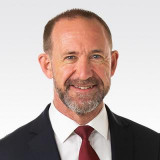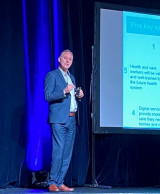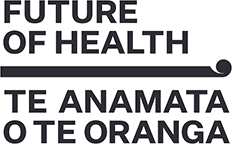Update from the Transition Unit - Friday 29 October 2021
Kia ora
Every week we are a step closer to creating a better health system that treats all New Zealanders equally. We’ve achieved further, substantial progress towards that goal with legislation central to fixing the system introduced to Parliament.
The Pae Ora (Healthy Futures) Bill sets the context for a system that works for everyone, no matter who they are or where they live.

Andrew Little, Minister of Health
Our future health system will have a strong focus on services designed and delivered locally but supported by a national system that ensures consistency across the motu.
With this in mind, the Bill paves the way for localities – geographic areas that will be used to plan and deliver services.
The Bill also establishes the Māori Health Authority. This will transform Māori health by addressing issues and poor experiences that have traditionally resulted in people avoiding contact with healthcare services.
We have already established Health New Zealand and the Māori Health Authority as interim entities – the Bill enables them to become permanent once the reformed health system comes into effect on 1 July next year.
The Bill also recognises the important role of Iwi-Māori Partnership Boards and Māori exercising tino rangatiratanga and mana motuhake when it comes to planning and decision-making for health services at a local level.
For too long the kind of healthcare many people receive has been shaped not by need, but on where you happen to live. At the same time our health system has been focused on trying to treat people in hospitals for conditions that could have, and should have, been dealt with sooner.
We are changing that. And the transformational change we envision starts with the Pae Ora (Healthy Futures) Bill. I encourage you to visit the Parliament website to learn about opportunities to be involved in shaping the final version of the Bill before it is passed into law next year.
This is a landmark piece of legislation that will change our future for the better. I look forward to providing further updates and the details of the Bill as it progresses over the coming months.
Andrew Little
Minister of Health
Interim entities stood up from 1 November
Update from Transition Unit Director, Stephen McKernan
1 November represents a further significant milestone in our work programme to reform Aotearoa New Zealand’s health system.
The two interim entities Health New Zealand and the Māori Health Authority will get underway as departmental agencies within the Ministry of Health – a temporary arrangement until they are established as permanent entities through legislation.
As part of the interim entity establishment, Acting Chief Executives have been appointed to ensure momentum is maintained and key workstreams are progressed until permanent Chief Executives are in place. I’m pleased to share that Martin Hefford and Chad Paraone have been appointed as Acting Chief Executives for interim Health New Zealand and the interim Māori Health Authority, respectively.
It was important for the Acting Chief Executives of the interim entities to have a deep understanding of the health reform work programme, a strong commitment to achieving equity in Māori health access and outcomes, and senior leadership experience in the health sector – criteria that both Martin and Chad absolutely meet.
As many of you know, both Chad and Martin are leading key workstreams in the Transition Unit that will, in time, transfer to the new entities. Their appointment to the Acting roles will ensure that progress with these workstreams is maintained and ensure alignment to the work of the future entities.
Both Chad and Martin also indicated to me, as part of the selection process, that they would not be applying for either of the permanent Chief Executive roles – recruitment for which is underway with appointments expected to be announced in the next month.
Recruitment for the permanent Chief Executives is underway – the boards anticipate being able to confirm appointments within the next month.
National roadshow hits second week
More than 950 members of the health workforce have taken part in sessions on the health system reform as the national roadshow wraps up its second week.

Deputy Director of the TU Martin Hefford presenting at the national roadshow
The roadshow visited Invercargill, Dunedin, Christchurch and Timaru last week, and moved on to Nelson and the West Coast this week.
The roadshows offer people across the health sector an opportunity to learn more about the reform from representatives of the Health Reform Transition Unit. Attendees, both in-person and virtually, have heard about why the reforms are taking place, the progress that is being made and what’s coming next. Health Minister Andrew Little and Associate Minister for Health Peeni Henare have also attended some of the sessions – either in person or virtually.
Deputy Director of the Health Transition Unit, Martin Hefford, said it’s been exciting to be out on the road talking to a wide range of people in the workforce.
"The health sector workforce has an absolutely critical role in delivering the transformation – they’re where the rubber hits the road. They need to know what the new system will deliver for them, and for the people, whānau and communities they care for," Martin said. "It’s been great to meet with people from right across the health system both to understand the key questions many have about the health reform, and to share as much information that we can on our transformation progress," Martin said.

A behind the scenes look at the roadshow
"We’ve got people joining us from local DHBs, hauora Māori and Pacific health providers, and primary and community health care organisations. It has included people from clinical roles, administrators, management and a range of other health professions.
Read more about the roadshows completed to date
New Ministry to lead Disability System Transformation
The Government has announced the establishment of a Ministry for Disabled People, hosted by the Ministry of Social Development.
The Ministry will lead cross-government strategic disability policy, deliver and transform Disability Support Services and progress work on broader Disability System Transformation.
In announcing the new Ministry, Minister for Disability Issues, Carmel Sepuloni, said the establishment of the new Ministry recognised that true transformation requires strong leadership across Government and the public service.
"The goals and aspirations of disabled people are at the heart of today’s announcement.
"The new Ministry will become an integral part of the machinery of government, leading to the realisation of a true partnership between the disability community and government."
The Health Reform Transition Unit will work closely with the new Ministry to ensure health services delivered to disabled people are accessible, consistent and relevant.
- Read more on the Disability System Transformation and how it links with the wider health reform
- Press release: Government delivers transformative changes for disabled people(external link)
- Carmel Sepuloni's speech on the Disability System Transformation and Accessibility(external link)
Setting clear expectations for consumer voice
The Health Quality & Safety Commission (the Commission) is seeking feedback on a draft Code of Expectations for engaging with consumers and whānau.
Ensuring the voice of whānau and consumers can be clearly heard within a future health system is a key piece of work within the reform. The work is being led by the Commission, supported by the Health Transition Unit, based in the Department of the Prime Minister and Cabinet.
The final Code of Expectations will set out how local, regional, and national organisations should engage and involve consumers, whānau and communities.
Dr Chris Walsh, Director of Partners in Care, the Commission’s consumer and whānau engagement programme, says the code will ensure everyone understands what is expected of the health sector.
“Organisations needs to include consumers and whānau in the design, delivery, evaluation and governance of health services.
“What that looks like can vary between organisations – a Code of Expectations takes some of the guesswork out of it for health providers.
“It signals to consumers and whānau, opportunities for involvement and more certainty over what to expect from the health system.”
The draft Code of Expectations has been developed with members of the Commission’s consumer network, consumer advisory group, and Te Rōopu Māori, and will be workshopped by consumers via in-person and online hui, before being finalised and published by Minister Little.
People are invited to share their feedback on the draft code by February 2022.
Read more about the draft code on the Commission’s website(external link)
People of the Transition Unit – Chiquita Hansen
There are a range of people with different backgrounds and experiences working in the Transition Unit, including many on secondment from within the health sector.
Chiquita Hansen has recently joined the TU, taking up a key role in the development of the interim New Zealand Health Plan – a key document that will set out how health services will be planned and delivered across the motu.

Chiquita Hansen
We get to know her a little more in this instalment of the People of the TU series.
Tell us a little about yourself
I am on secondment from THINK Hauora – the MidCentral District Primary Health Organisation. I have worked for 40 years in primary and community settings. For half of that time I have held leadership roles in nursing, including district nursing and Director of Primary Health Care nursing at MidCentral DHB. In 2010 I was seconded to THINK Hauora (formerly Central PHO) as Clinical Director and subsequently became the Chief Executive in 2014.
THINK Hauora holds a strong focus on addressing the social determinants of health – in 2019 we developed a six-year strategy which appreciates these connections. With this background, I’m excited about the opportunity to work on the transformational reform of the health sector that approaches health from a holistic perspective.
What’s your role as part of the health reform?
My official title is Lead Advisor, Primary and Community Care. My main focus is on contributing to the development of the interim New Zealand Health Plan. We have an amazing team of people involved in the planning and support of this work. Everyone is extremely passionate about transforming our health system and each brings a different perspective to the work.
What are you working on at the moment?
Benedict Hefford and I are leading the Primary and Community working group and in partnership with Dr Brendan Marshall and Jacky Tsao I am leading the rural working group. These are advisory groups that we will be linking in with as we develop the interim Health Plan. There is a lot of work to do over the next few months as we work to ensure we have a first draft of the interim Health Plan by early next year.
What happens next?
We have our inaugural working group meetings scheduled over the next few weeks and plan to have four meetings with each working group. A series of key stakeholder meetings are also being planned over the few months. These will help inform the primary and community and rural components of the interim NZ Health Plan. If people are interested in sharing their thoughts with us they can email us at enquiries.tu@dpmc.govt.nz
What is your advice to the sector?
There are amazing opportunities to integrate care across primary and community settings with the reform. Right now, primary and community care need to keep their valuable mahi. I also encourage people to take up opportunities to get involved in building a health system that will support all New Zealanders to live longer and have the best possible quality of life.
If there are any particular roles or areas of work within the Transition Unit you’d like to hear more about, email enquiries.tu@dpmc.govt.nz
People Pānui
Health system reform news and updates for the health workforce
The transition unit has established a regular newsletter with updates and information specifically for those working in the health system.
The People Pānui will include key updates that have a specific link to the workforce, such as development of the Health Charter.
The People Pānui is available on the health sector page
This page will be regularly updated with future versions of the People Pānui, Q&As, news and updates.
Printable version
Update from the Transition Unit - Friday 29 October 2021 [PDF, 352 KB]
